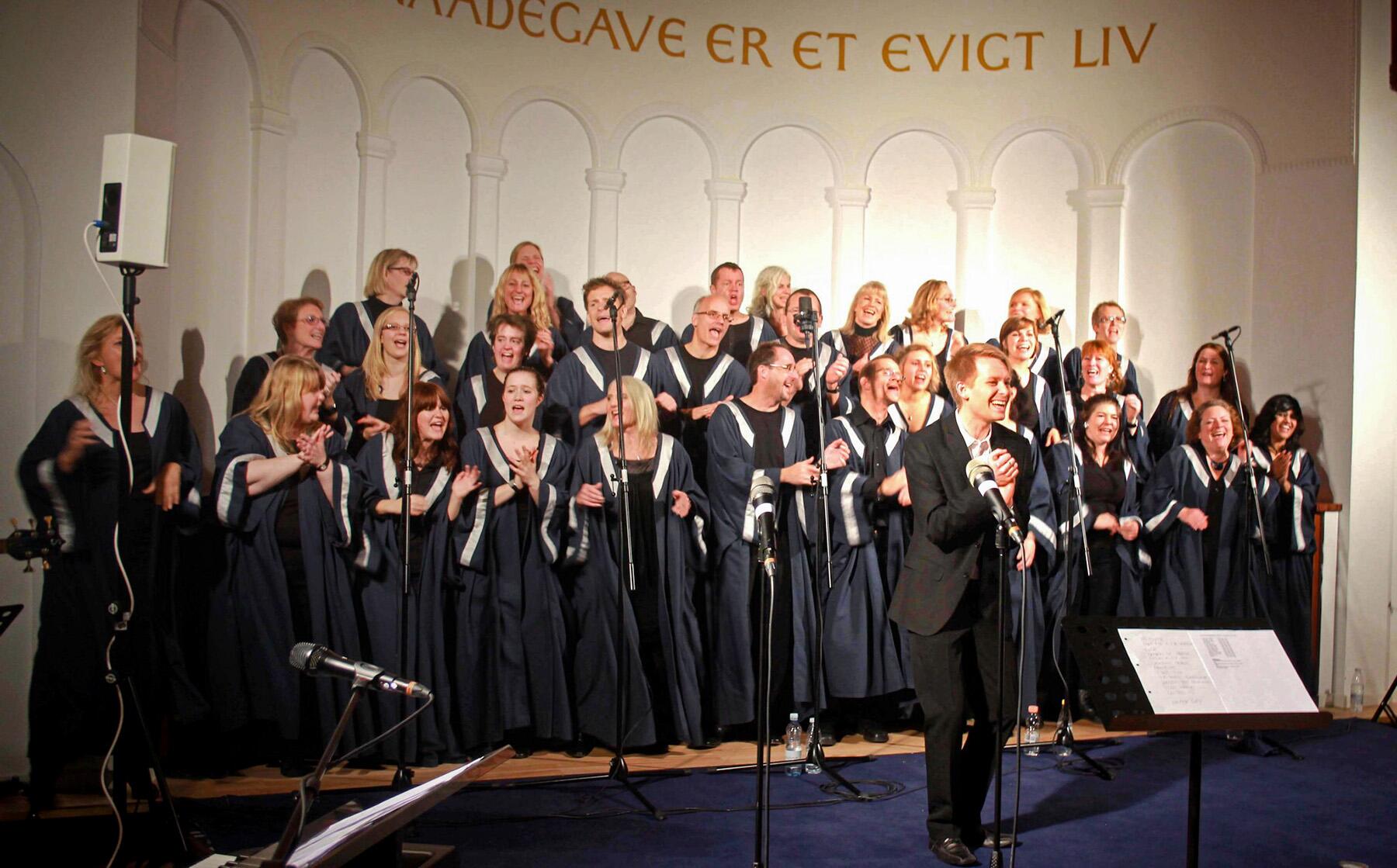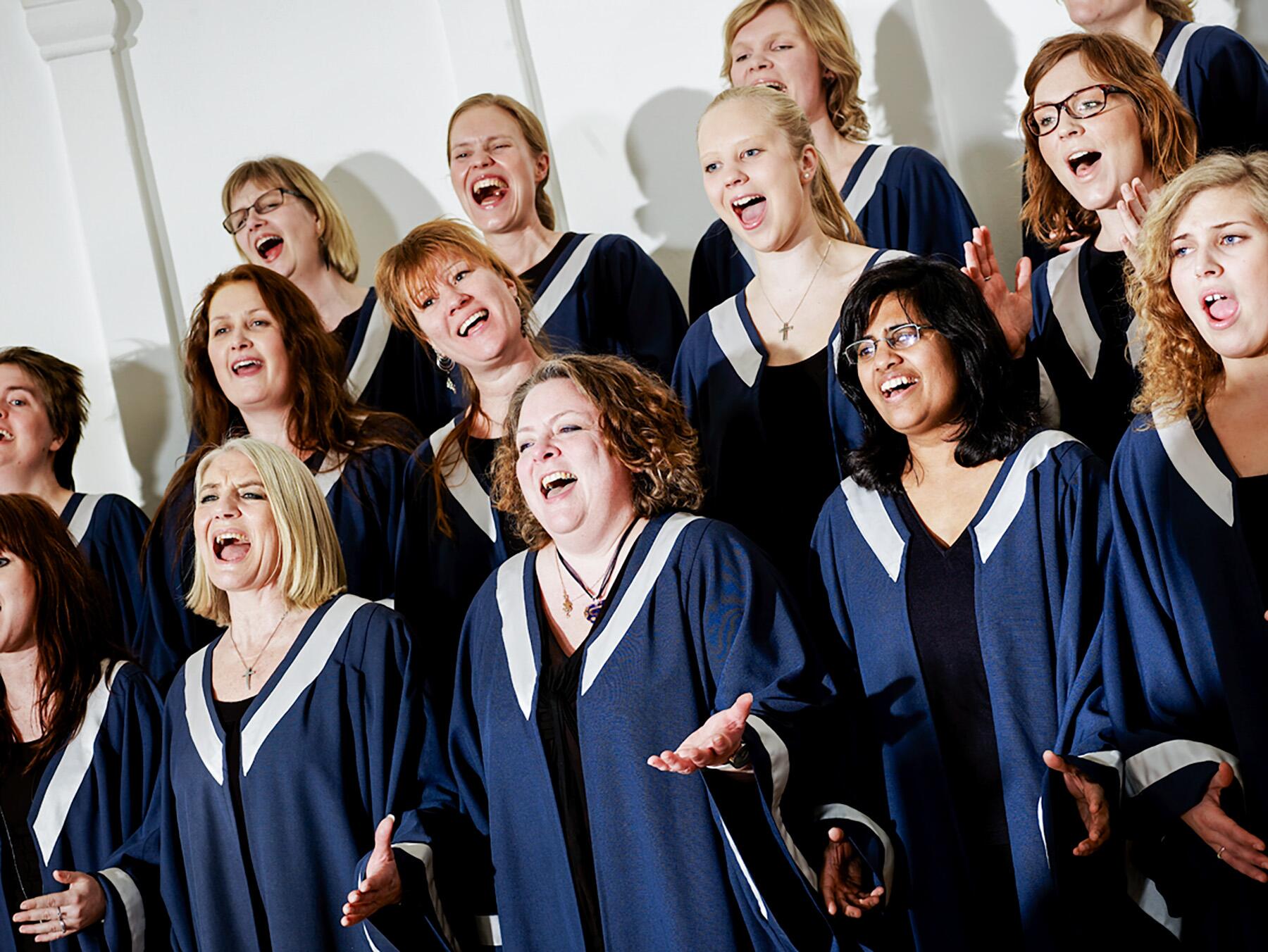Hint: Sister Mary Clarence might have had a *little* something to do with it…
Imagine a late spring weekend at Copenhagen’s famed Tivoli Gardens. The daffodils and dahlias are just starting to push past their buds, rides are in full swing, and guests are gathered in the amusement park’s cafes and green spaces, enjoying the bright sun.
Suddenly, dozens of robed choir members break out into joyful, exuberant song on the main entertainment stage, performing “Stand By Me”, “Oh Happy Day”, and “I Saw the Light” with audience members clapping and joining in. While it seems straight out of Sister Act, this surprising scene takes place each year at the garden’s Gospel Festival.
Danes have a global reputation for being subtle, reserved, and a bit buttoned up. And Denmark isn’t exactly the most devout place on the planet either, with regular church attendance hovering at just 2-3%. Despite those facts, Denmark has an active and rousing gospel tradition spanning several decades. While the genre originated in the United States, it’s also beloved in the Nordic country. In fact, the capital city Copenhagen boasts more than four dozen active gospel choirs, each practicing and performing regularly around the region.
So how did this particular piece of Americana make its way to Demark, and why did it take root? Turns out it’s a tale of great migrations, innovative musicians, and pop culture’s mighty global influence.
Recommended Fodor’s Video
Related: Who Are These Child Soldiers With Antique Guns Wandering Copenhagen?
Transatlantic Singing Traditions
While gospel music didn’t emerge until the 1930s, its predecessor, the spiritual, had been around for generations. Sung in groups by enslaved Africans part of the transatlantic slave trade, spirituals combined a call-and-response improvisational style. Its lyrics leaned heavily into Christian and Biblical references and retellings.
During the Great Migration, millions of Black families left the South, taking their music with them. Pioneers including Thomas A. Dorsey and Mahalia Jackson pushed back on traditional church conventions, weaving ragtime, jazz, and blues into the spiritual, and gospel was born. In 1969, the genre exploded into the American mainstream with the release of “Oh Happy Day.” The exuberant arrangement, performed by the Edwin Hawkins Singers, sold more than a million copies in just two months.
The Danes have their own communal singing tradition. Morgensang, or “morning song,” is the custom of performing folk songs together at parties, in offices, and schools. The practice fosters a feeling of togetherness in tough times; during World War II the country held massive group sing-alongs, and sing-from-home events were popular at the height of the COVID-19 pandemic.
While the country is certainly familiar with the solidarity group singing can bring, Mark Lewis, author of the book The Diffusion of Black Gospel Music in Postmodern Denmark: How Mission and Music Are Combining to Affect Christian Renewal, says something profound and deeper sets gospel apart.
“A lot of traditional Danish music tells stories about some aspect of daily life,” explains Lewis, who is also senior pastor of the United Methodist Church in Strandby, Denmark. “Gospel music isn’t so much storytelling as much as it is transcultural, with themes of triumph, overcoming, and going to a better place. There’s a catharsis going on there.”
The Innovators
While the path to gospel acceptance in Denmark might have been paved with morgensang, it took visionary musicians to win over initially skeptical audiences.
One such trailblazer was the late Etta Cameron, a celebrated jazz singer who moved to Denmark in 1972. Born in the Bahamas, Cameron missed her church traditions and wanted to perform her beloved gospel in Copenhagen. It didn’t go over well at first.
“I remember interviewing Etta,” said Lewis. “She said at first, gospel was rejected in the churches. Jazz, that was cool, but gospel was somehow perceived as sort of low culture. When gospel first broke out in the United States, there were a number of Black churches that also rejected it for the same reason.”
But Cameron stayed true to her gospel roots and became one of Denmark’s most beloved musicians. She released more than a dozen albums, introducing the entire country to gospel. She appeared in several films. In 1997, Queen Margrethe made her a Knight of Dannebrog, recognizing her many contributions to Danish culture.
As Cameron won over Danish audiences with her gospel sound, Peter Steinvig got them to start singing that sound for themselves.

Steinvig first encountered the genre during his studies at Duke University, came home to Copenhagen, and in 1975 founded the KEFAS Choir. It’s considered Denmark’s first gospel chorus and is still active today. Steinvig then helped organize the Copenhagen Gospel Festival, where his friend Mark Lewis was floored to see the normally introspective Danes belting out the American music together, in English, and with such deep emotion.
“Just to see the energy, it was palpable,” Lewis explained. “People were learning the style and I was really mesmerized by that experience. That’s how it all got started for me. Subsequently, as a minister, I ended up being involved in gospel choirs as a musician and chaplain.”
The Sister Act Effect
While gospel’s Danish seeds were planted in the 1970s, twenty years later saw them in full musical bloom. The popularity of gospel choirs, festivals, and competitions exploded across the country.
“Something happened in the early ‘90s,” said Lewis. “Globalization certainly played into it, as Danes had immediate access to all sorts of ideas and music from all over the world. Increasing interest in American pop culture also had an effect.”
And one particular piece of American pop culture likely played a starring role in getting Danes to sing with a joyful noise: Sister Act. In the 1992 movie classic, Whoopi Goldberg’s character Deloris hides out in a convent, becomes Sister Mary Clarence, and teaches her fellow nuns gospel. It was a box office smash not only in America but Scandinavia as well.
“In the early 1990s, Denmark’s fascination with the U.S. was at an all-time high, and the movie Sister Act was a huge hit,” said Christina Daubjerg Newman, an assistant at Wonderful Copenhagen, the city’s tourism board. “Gospel music became even more popular.”
And that Sister Act popularity is still going strong: a musical adapted from the iconic 1992 film is scheduled to run September 2023 at Copenhagen’s Det Ny Teater, one of Denmark’s largest theaters.
A Lasting Legacy?
With its “good news in bad times” theme, gospel is now a global phenomenon, with choirs popping up across Europe, Australia, and even Japan. However, the music’s influence remains especially intense in Denmark. In addition to the many gospel groups across the country—some based in churches, others completely secular—there are plenty of workshops, conferences, and even an International School of Gospel Music. Each offers entry points for singers of any musical ability. Lewis says that “come as you are” spirit is particularly appealing to Danes, playing into their sense of hygge, bypassing cultural constructs, and promoting a sense of emotive ease, as well as the ability to let loose just a bit.
“From competitive to cozy, people are invited,” said Lewis. “They can just come, learn the music, and enjoy. No matter what, they learn to sing with that kind of energy and emotion. There’s a catharsis there.”

But given today’s fleeting nature of entertainment, especially in the age of TikTok trends, Insta reels, and instant social media stars, will the Danish demand for gospel stick around for the long run? For now, Lewis says that’s a song that remains unwritten.
“Change is inevitable, but there seems to still be a good energy around the music,” said Lewis. “What’s the future of this movement? Will it become intergenerational, will it last? It’s still a big question mark for me.”




